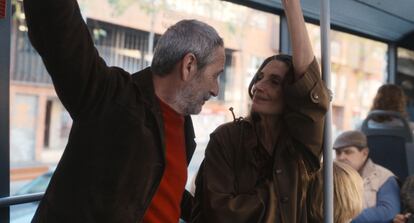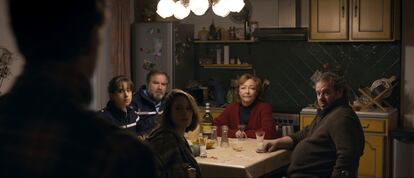He thriller rural and irreverent Misericordia, by Frenchman Alain Guiraudie, has been the winner of the Golden Spike of the 69th edition of the Seminci of Valladolid. Curiously, the film by the filmmaker, responsible for titles such as The unknown of the lake, Rester vertical o An anonymous hero, was the title that closed the competition, yesterday, Friday. The Silver Spike fell from the same a Stranger Eyes, by Yeo Siew Hua (Singapore) and Dust will beby Carlos Marques-Marcet, in which the filmmaker investigates euthanasia through a married couple made up of Alfredo Castro and Ángela Molina. With a soundtrack by María Arnal and choreographies by La Veronal, Dust will be It had just won the award for best film in the Platform section of the last Toronto festival.
On Misericordia, The jury explained, in the justification of its ruling, that “it was impressed by the film” because “its lightness hides a complex balance of genres and tones, under whose appearance of thriller“Provincial comedy hides a deep meditation on how desire and guilt make us predictable and incomprehensible to each other.”
Misericordia, that adorns your soul thriller Rural with a lot of irreverence and black humor, it describes the earthquake that causes the return of a young man to his town to attend the funeral of the baker for whom he used to work. Upon settling in the widow’s house (played by Catherine Frot), the deceased’s son begins to be eaten away by suspicions. On Friday, at the film’s press conference, Guiraudie (Villefranche-de-Rouergue, 1960) explained the differences between a novel – the thriller It is based, very loosely, on the novel Rabalaïre (2021), written by the director—and a script: “When I write a novel, I include many digressions, a narrator who is always asking himself questions, questioning what he is doing, doubting enormously. On the other hand, the work in a film is more about removing things and being concise, because you don’t have that space for the narrator’s doubts and his thoughts. They are really contrary processes.” Misericordia It also won the award for best screenplay.
In the film, the filmmaker creates a growing sense of bewilderment, thanks to his staging: “I filmed each protagonist as if another character were watching him. That’s why there are also a lot of close-ups. If the camera desires at the same time as the character, you have to film as if you were looking at someone you desire, but also as if you were looking at someone you also fear.” Hence his following explanation: “I have the impression that in human relationships there is always a bit of both, a tension between desire and fear.” And sexual desire is the driving force behind Guiraudie’s cinema, who achieved fame in auteur cinema with The stranger of the lake: “Mystery is the great driving force of a film and desire is the great mystery of life. I structure my films around that because I think it drives them. I look for in my films what retains me and I think that it will have the same effect on the public.” Misericordia It also won the award for best screenplay.

The best actor award has also been awarded from the same to Jan Gunnar Røise and Thorbjørn Harr, the protagonists of the Norwegian Sex. The best actress award went to Laura Weissmahr, who fiercely composes a very complex character, that of María, the writer who stars. Hail Mary, by Mar Coll. Ángela Molina and Alfredo Castro have received a special mention in the interpretive section for Polvo estar. Black Dog, by the Chinese Guan Hu—who had just won the Un Certain Regard section at Cannes last year—has won the awards for best direction and best photography. The jury, made up of the actress Aida Folch, the filmmaker Luis López Carrasco, the American critic and programmer Devika Girish, the Greek filmmaker Sofía Exarchou and the German documentary producer Ingmar Trost, also gave a prize for best editing to the work of the Portuguese Pedro Filipe Marques in Grand Tour, by Miguel Gomes.

The public voted best film in the official section for Bob Trevino Likes It, by the American Tracie Laymon, and the Fipresci prize for international critics went to Christmas Eve in Miller’s Point, by Tyler Taormina.
In the rest of the honors, the prestigious Pilar Miró award stands out, given to a Spanish filmmaker for his first or (in this edition it has been expanded) second film, which was won by Elena Manrique for End of party, with which the veteran producer creates a provocative and ironic vision of immigration. In the Time of History section the documentary won Qing chun (Gui), by the Chinese Wang Bing, and Henry Fonda for President was recognized with a mention from the jury. The best Spanish documentary went to resistance box, by Concha Barquero and Alejandro Alvarado.
The Punto de Encuentro jury chose the French film as the best film Holy Cow, by Louise Courvoisier. La Espiga Arco Iris, for the film that best addresses the LGTBI+ world, went to Three kilometers to the end of the world, by the Romanian Emanuel Parvu, and the Green Spike, intended for the film that explains the challenges of sustainability and the environment, was for Caught By The Tides, by the prestigious Chinese director Jia Zhangke, who has made his latest work with parts of his previous films.

